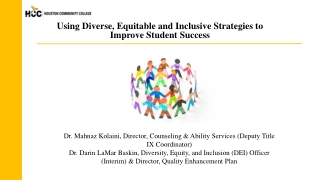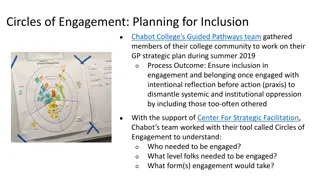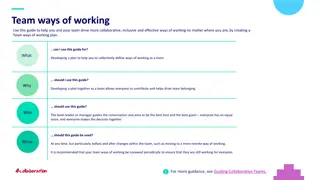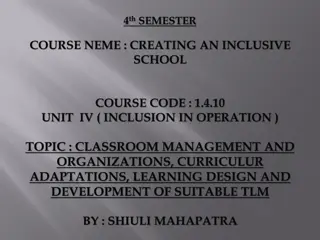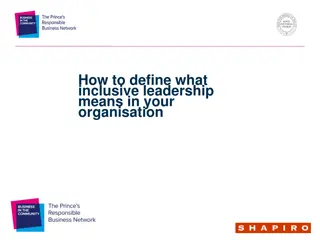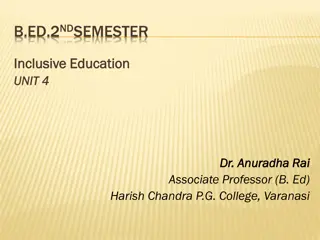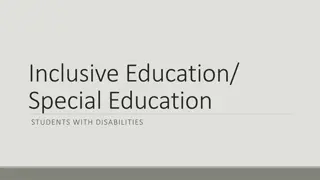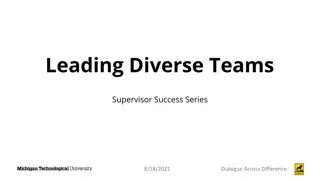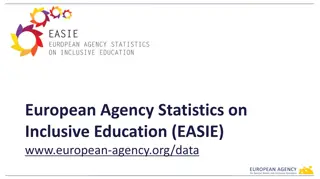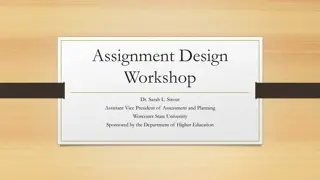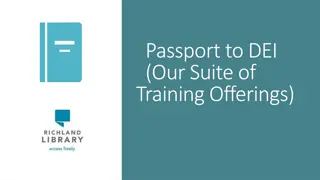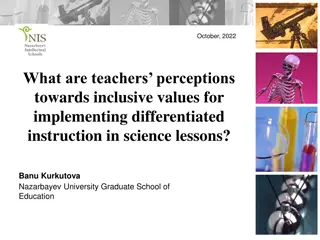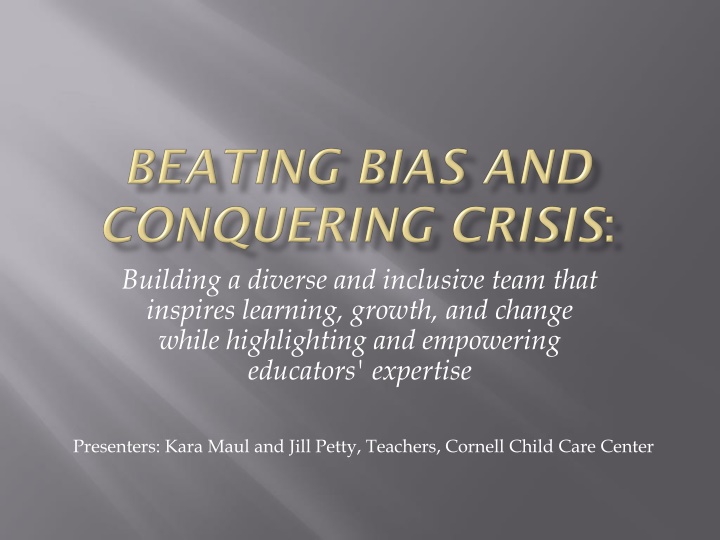
Empowering Inclusive Teams in Education: Strategies for Bias and Crisis Management
Explore ways to build diverse and inclusive teams in education by empowering educators' expertise. Learn strategies to overcome bias and crisis, enhance teambuilding, and handle challenging situations effectively.
Uploaded on | 1 Views
Download Presentation

Please find below an Image/Link to download the presentation.
The content on the website is provided AS IS for your information and personal use only. It may not be sold, licensed, or shared on other websites without obtaining consent from the author. If you encounter any issues during the download, it is possible that the publisher has removed the file from their server.
You are allowed to download the files provided on this website for personal or commercial use, subject to the condition that they are used lawfully. All files are the property of their respective owners.
The content on the website is provided AS IS for your information and personal use only. It may not be sold, licensed, or shared on other websites without obtaining consent from the author.
E N D
Presentation Transcript
Building a diverse and inclusive team that inspires learning, growth, and change while highlighting and empowering educators' expertise Presenters: Kara Maul and Jill Petty, Teachers, Cornell Child Care Center
Kara Maul Teacher, Cornell Child Care Center (since 2008) Worked with young children since 2002 Has substantial experience working with Infants, Toddlers, and Preschoolers Jill Petty Teacher, Cornell Child Care Center (since 2010) Been working with preschool aged children since 2005 Background in social justice education, advocate for diversity and inclusion in ECE
Define bias in the work place Further understand crisis in the workplace Experience firsthand some strategies on beating bias and conquering crisis Apply strategies for teambuilding Utilize resource packet
Geographic Background Body Size Clothing Choice Drinker/Non-drinker Relationship Status Socioeconomic Class LGBT Speech Profession Technological Ability Education Gender Race Parental Status Music Preference Social Circle Age Hobbies Dietary Choices Smoker vs. Non-Smoker Body Modifications Eye Color Ability Level
Count off Split into groups Scenarios
You wake up to a text message from a coworker asking if you had, "heard the news" yet. You open the daily newspaper with your center being the front page story. Unfortunately, the headlines are not those one hopes for. Over the course of the next twenty four hours, your life is flooded with the aftermath of a highly negative article that has your community instantly rumored to have turned against you, your client talking about terminating your contract, and no end in sight. The article highlights a range of information including licensing violations in high quantity and quotes families on their dissatisfaction with the quality and turnover rates at your center. What are your immediate responses/reactions? How would it feel if this happened to you in your center/school/program today? How do you respond as the director? How do you respond as a member of administration? How do you respond as a teacher? How do you respond when a local reporter approaches you asking for your opinion on the article? (Challenge your group to come up with creative responses outside of no comment. )
Your center has been feeling the effects of high turnovers, low retention, and consistent under-enrollment. In each classroom there are multiple children exhibiting challenging behaviors and parents and teachers alike are expressing frustration with a lack of consistency and support. After trying to justify the gaps with excuses including "seasonal turnover", high transient community, and "growing pains," you realize that there are systemic challenges at play. Parents come into the center every day asking both teachers and administrators why their "favorite teachers" keep leaving. As a teacher working at this center reflect on possible answers to the following questions posed to you from concerned and frustrated families within your classroom: What can I do to support you so my child does not lose another teacher? Is administration even bothering to support you to ensure your work satisfaction? Can you prove it? What is happening at this center to make so many teachers and families leave? As the director of this center, brainstorm answers to the following questions from families and staff members: What are you doing to retain high quality educators? Why aren't you paying my child's teacher enough? (After all, my child's tuition rivals that of a college education). As a team (from director to substitute and every title in between) brainstorm answers to the following questions: What steps can you take as an ECE at the center to improve retention and stabilize enrollment? What systems can you put in place to support a high quality staff that is also energized to promote positive change? How do you turn negative gossip into positive team morale?
Your supervisor pulls you into the office and requests your support for a center in crisis. You agree, happy to help and leave almost immediately. When you arrive at the center you are informed of the nature of the crisis: allegations of abuse were made against several teachers by parents and due to co-teachers, administrators, and cameras in every classroom ALL of the center staff have been put on administrative leave (the majority for failure to report as mandated reporters). The center has been shut down for several days and has been scheduled to open bright and early the following morning. The current interim administrative team tells you that you and your new team are holding an open house for the current families- now. Your position is to form parent partnerships and implement best practices to get the center back on its feet and ready for their NAEYC re-accreditation visit within 4-6 weeks. You walk to the classroom that will be your home for the next couple of months in tandem with a local stranger (aka your new co-teacher) and together you approach the families in your new classroom. Everyone has questions, frustrations, and overarching hesitation. You find out many of the currently enrolled families have chosen to withdraw from the center and the families who have stayed are hyper-aware of the center s staffing situation and the allegations that had the center shut down. What do you say to the parent/guardian that asks: "Why should I trust you with my child?" and "Where is Ms. Pam? She is my child's favorite teacher and the only one who understands his special needs" How do you restore each family's trust in childcare? How does this change your perspective on mandating reporting? Can you articulate the importance of mandating reporting in a way that will resonate with new staff members or staff members who do not feel mandating reporting is necessary?
Team builders Rotate facilitators Alter length and depth Consistently- staff meetings, teacher training days
Talent Based Leadership Artistic Loves to cook Connected to community Writer Proofreader Presenter Brings humor Multi-lingual Organized Athletic Technology proficient LOUD Quiet Listener Wise
Committees! Diversity and Inclusion Social Well-Being Health and Safety Technology Enrichments Community service/outreach Resource Recruitment and retention
Open dialogue Open doors Active listening (2 min 2 min) Building a team outside the walls of work Accepting the uncomfortable Taking action
Meet back in your crisis scenario groups Find your materials: spaghetti and marshmallows Your task: To build the tallest standing tower possible in 10 minutes.
PLEASE reach out to us with any questions! Kara- kara.maul@gmail.com Jill- jillepetty@gmail.com

